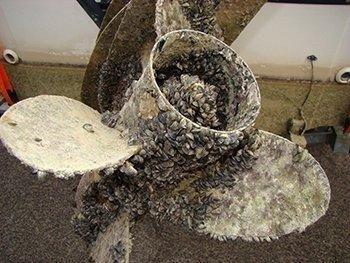If you’re in southern Utah and you’re transporting a boat north on Interstate 15, you must exit the freeway at the port of entry just south of St. George.
After exiting the freeway, technicians with the Utah Division of Wildlife Resources (DWR) will ask you some questions to determine if your boat might be carrying quagga mussels. They’ll also inspect your boat to see if any quagga mussels are attached to it. They’ll also look to see if there’s any standing water in it.
If you’ve been on a water that has quagga mussels, Utah law requires that the boat be decontaminated. You can decontaminate your boat on your own by allowing it to completely dry out. Or, you can have a DWR technician decontaminate it with hot water.
Jordan Nielson, aquatic invasive species coordinator for the DWR, said the ability to decontaminate boats at the port of entry is limited. If technicians can’t decontaminate your boat, they’ll direct you to a location where it can be done.
“Whether your boat is decontaminated at the port of entry or at another location, it won’t cost you a thing,” Nielson said. “The decontamination is free.”
After they’ve inspected your boat, the technicians will place a tag on it that indicates the boat has undergone the required inspection.
Nielson explained that the station at the port of entry is staffed seven days a week. DWR personnel will continue to staff it until sometime this fall.
“All of the reservoirs in the lower Colorado River drainage have quagga mussels in them,” Nielson stated. “Having this station allows us to intercept boats that are coming from those waters.”
Nielson said anyone transporting a boat north on I-15, nonresidents and residents alike, must stop at the port of entry.
“If you pass the port of entry, law enforcement officers will find your vehicle and pull you over,” he said. “Don’t risk a fine. Pull into the port of entry and help us keep quagga mussels out of Utah.”
Why the concern?
There are many reasons why Utahns don’t want quagga mussels, or their cousins, zebra mussels, brought into the state:
- Mussels can plug water lines, even very large diameter ones.If mussels get into water delivery systems in Utah, it will cost millions of dollars to try to remove them. Utahns would likely pay for the removal through higher utility bills.
- Mussels remove plankton from the water column, the same plankton that support Utah’s sport fish and native fish. The mussels could devastate fisheries in Utah.
- Mussels can damage your boat by attaching themselves to your boat’s hull and fouling the boat’s engine cooling system.
- When mussels die in large numbers, they stink. Also, their sharp shells can cut your feet as you walk along beaches where the mussels died.
STD of the Sea
More information about quagga mussels and what you can do to keep them out of Utah is available at www.stdofthesea.com.


